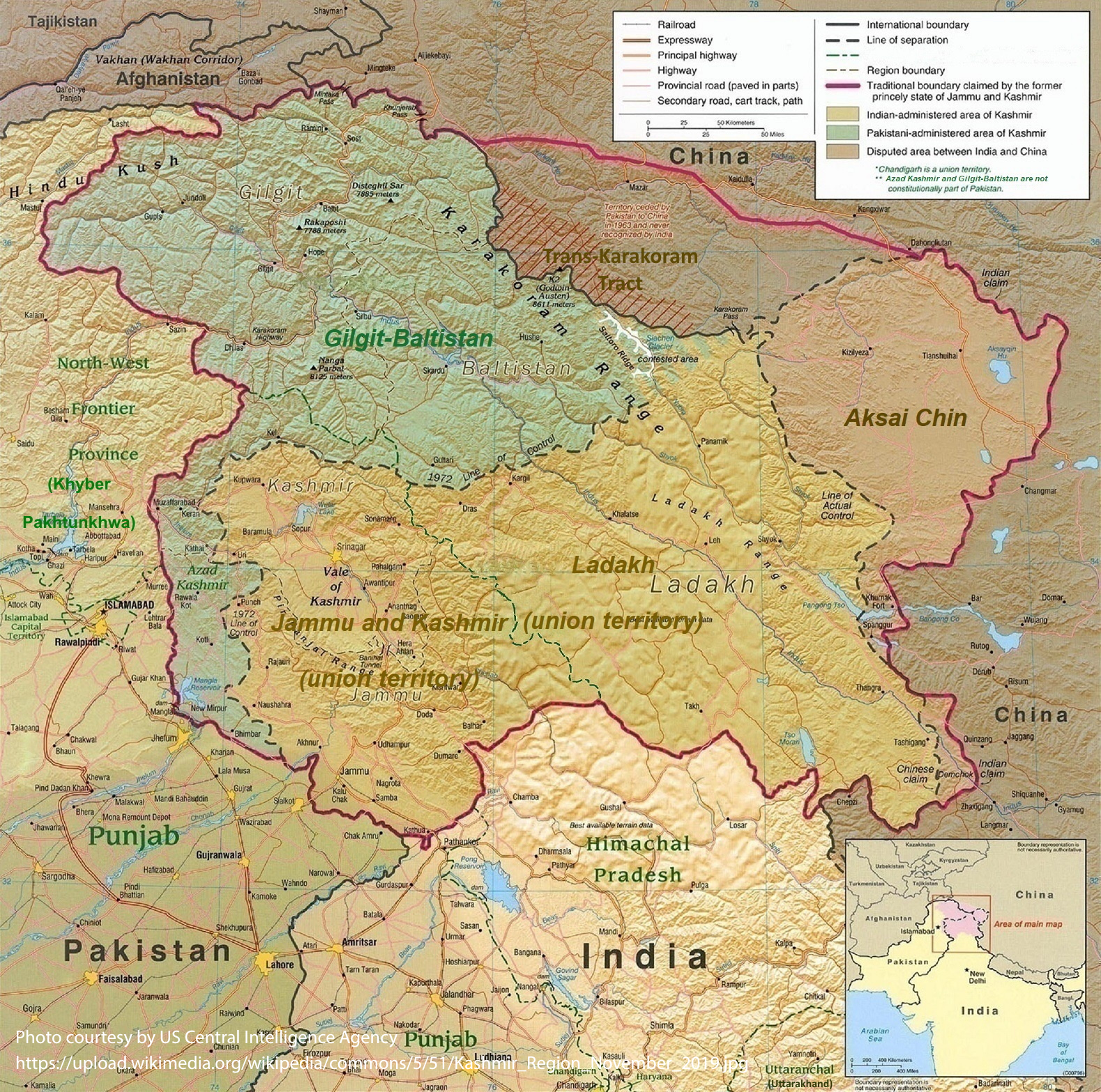Action committees, protests and marchers overcome official resistance in Kashmiri communities.
When we entered the jam-packed Muzaffarabad, the capital city of Pakistan-administered Kashmir (PaK), the locals were kissing our hands and expressing their love for us by chanting slogans:
Aaa gaye aa gaye aa gaye maser (Our cousins have come to us)!
Jiye jiye jiye maser (Long live our cousins!)
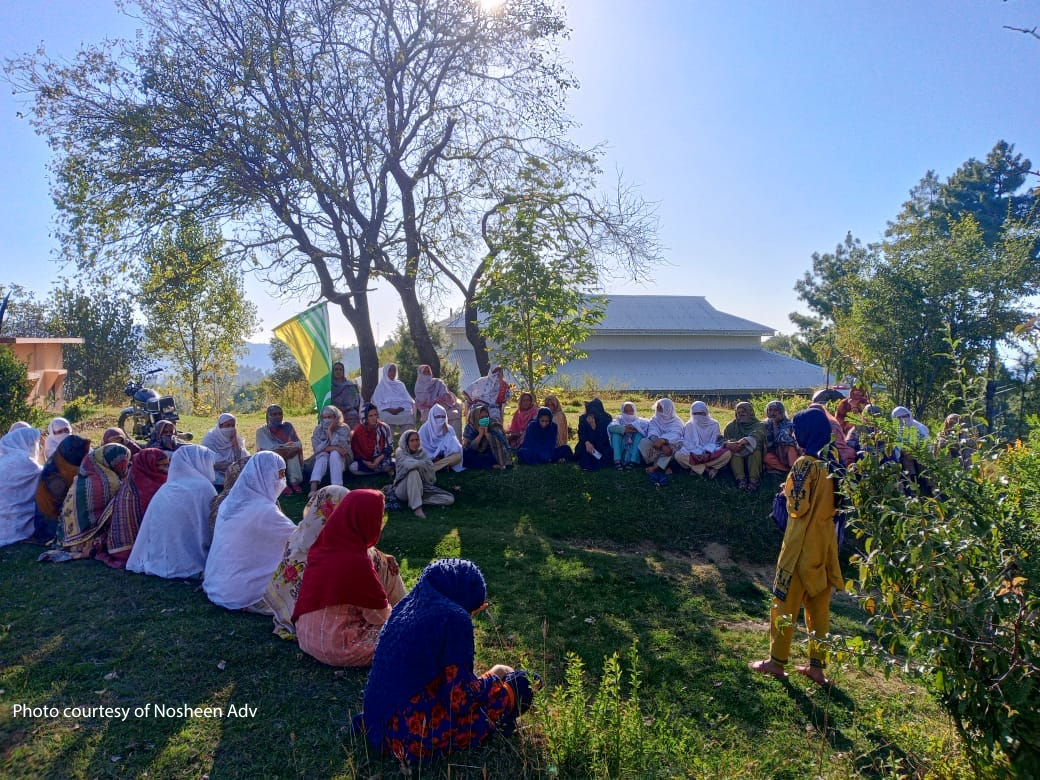
At the same time, the city was engulfed in smoke rising from the shells fired at the protestors and the sounds of heavy gunfire echoed through the valley.
This is how the scene was narrated to me by 35-year-old Rizwan, a trader from Rawalakot, a city 100 kilometres south in the Poonch district. His face turned red with overwhelming emotions as he recounted the arrival of caravans of people in Muzaffarabad on May 13, 2024. The state, known here as Azad Jammu and Kashmir (AJK), has a population of more than 4.5 million people, of which more than one million were marching towards Muzaffarabad.
“The locals in Muzaffarbad were more than happy to see us as they heard rumours that the caravans coming from the Poonch Division turned back after being stuck at Dhirkot,” said Rizwan, adding that the mobile services and the internet were suspended in the so-called independent state by the Pakistani government and people were not able to get updates about caravans and other developments happening around them.
The long march was called on by the Jammu & Kashmir Joint Public Action Committee, a social organisation formed in 2023 because of the failure of government and mainstream political parties to address issues. The action committee demanded that the AJK government cut prices of wheat flour and electricity and end the privileges being enjoyed by the ministers, lawmakers and the bureaucracy as AJK cannot afford such luxuries.
Protests in support of these demands began in January 2021, but gained momentum after the launch of a sit-in at Supply Bazaar, Rawalakot, on May 9.
PaK, a region of lofty mountains and valleys, experiences cold weather throughout the year, with frequent snowfall and rainfall. As a result, it relies heavily on wheat flour as a staple food, which is predominantly sourced from the Punjab province of Pakistan. When a flour shortage occurred, triggering unrest in Rawalakot, the People’s Rights Movement was formed by leaders of nationalist parties including Jammu & Kashmir Liberation Front (JKLF), National Awami Party (NAP), National Student Federation (NSF), and People's Revolutionary Front (PRF), initiating the sit-in.
Similarly, in July 2022, when the government raised electricity tariffs and imposed double billing in November 2022 for consumers exceeding 200 units of electricity, protests erupted across every district in Kashmir. The People’s Rights Movement garnered support from people of other districts of Kashmir, who had formed action committees at union council and tehsil level, leading to widespread demonstrations across the state.
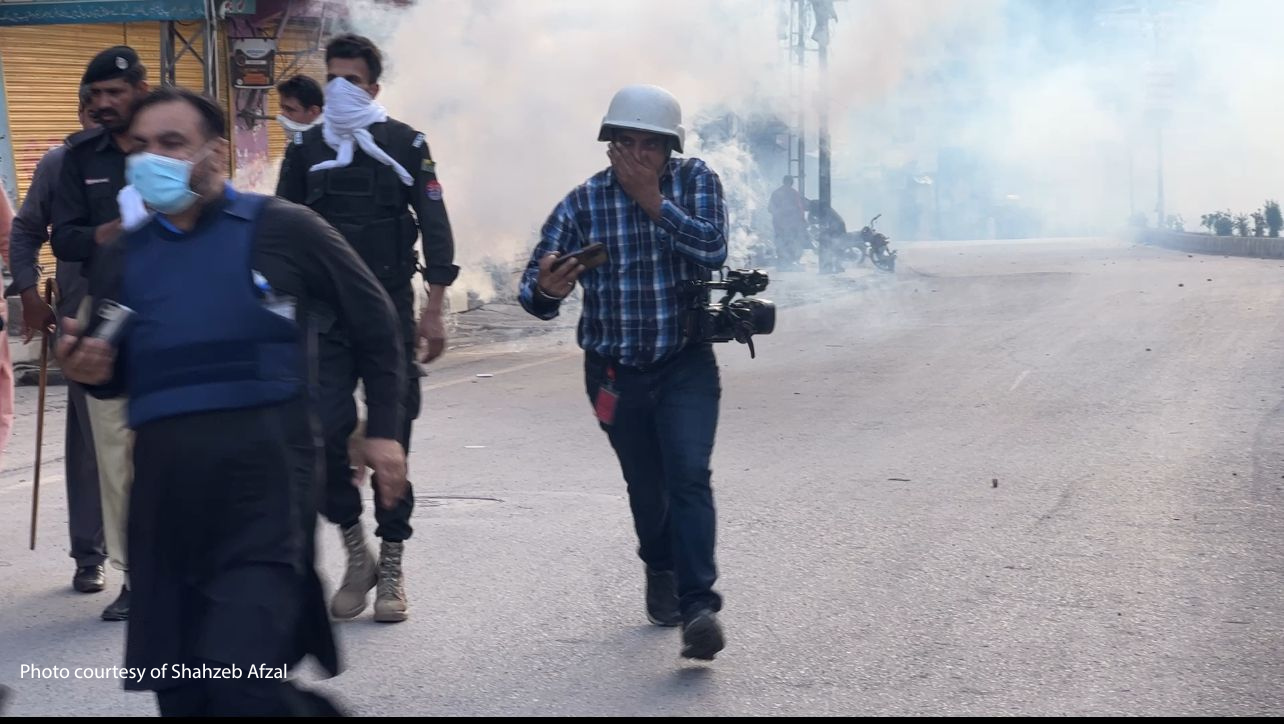
These protests culminated on September 5, 2023, when shut-down strikes and transport stoppages paralysed three divisions of Kashmir. This prompted a joint assembly of action committees from various districts in Muzaffarabad on September 16.
During this meeting, 200 representatives from these action committees convened and decided to form a unified entity encompassing all districts: the Jammu & Kashmir Joint Public Action Committee. Comprising 31 core members from each district, this committee aimed to consolidate efforts and amplify the collective voice of the Kashmiri people by following the People’s Rights Movement’s charter of demands.
Initially, the Joint Public Action Committee pressed for 10 demands:
- Subsidy equal to the Pakistan government’s longstanding subsidy for wheat flour in Gilgit-Baltistan, a disputed region now administered by Pakistan, should be given in AJK.
- Electricity tariff on consumers should be fixed, and thus lowered, according to the production cost of electricity generated from Mangala Dam, located in Mirpur district of PaK.
- The unnecessary privileges such as luxury vehicles, and free fuel and electricity endowed by the government on the ruling class and bureaucracy should be completely eliminated.
- The ban on student unions, imposed in 1988 on the pretext of campus violence, should be lifted and elections should be held.
- AJK state-owned Bank of Azad Jammu and Kashmir should be given Scheduled Bank status, indicating it has sufficient capital and reserves
- Local government representatives, elected in 2022, should be given funds and powers they’ve been denied.
- Cellular and internet services should be improved in Kashmir, where they are weak and unreliable.
- Property transfer tax in Kashmir, now at 33 percent, should be reduced. It’s 7 percent in Pakistan.
- Accountability Bureau, an anti-corruption watchdog, [U1] should be activated in Kashmir and the Accountability Act should be amended.
- Cutting of live trees in the forest, often done illegally, should be completely banned, and legislation should be enacted to empower the legal, local wood industry.
In response of the establishment of joint action committee, the AJK government arrested many committee members, and protestors were sacked. During this time, more than 50 baseless criminal cases were filed against protest participants, while many hundreds were taken into custody.
In August 2023, the prime minister of Azad Jammu and Kashmir, Chaudhry Anwar-ul-Huq, said about the protestors during a media talk that “those demanding free electricity, can get free death.”
This attitude agitated the people and they started gathering electricity bill copies from every house and setting them on fire. In Rawalakot, bills were burnt to ashes every month in front of a large crowd in Supply Bazaar and Katchery Chowk. Similarly in Muzaffarabad, bill copies were drowned in the river water, while in Kotli district of PaK, they were buried in the graveyard.
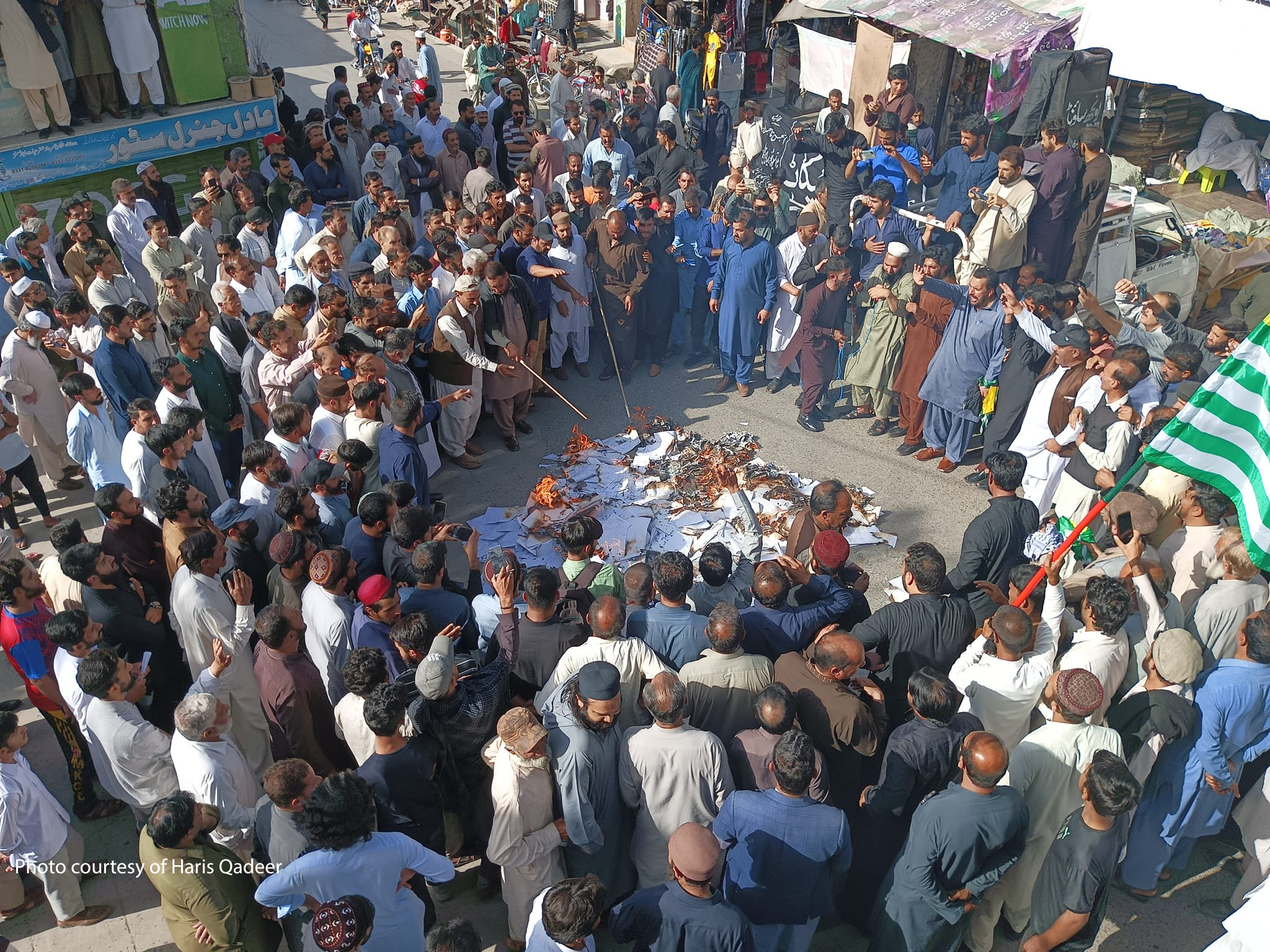
Meanwhile, the government increased efforts to crush the movement. It even did not allow the action committee to hold its meeting on October 2, 2023 in Bagh city of Poonch Division. As a result, the committee relocated its meeting to a secret location and decided to observe shutdown and transport strike and hold rallies in every part of Kashmir on October 5, 2023.
The committee also decided that women and students of the region would hold protest rallies on October 10 and October 17 respectively, while protest demonstration by people of all walks would be held on October 28, 2023.
The people of Kashmir continued holding protests, including sit-ins, shutdown strikes, transport strikes, and rallies, but they did not prove to be as beneficial as the rally held by Kashmiri women on October 10, 2023 proved to be. In a traditional place like Kashmir, the fact that women joined the rallies, with support of their husbands and families, demonstrated the gravity of the situation. tOn the same day the women’s rally was announced, the Azad Jammu and Kashmir prime minister on the same day formed a reconciliation committee of 16 ministers to negotiate with the action committee over its demands.
But this committee, instead of taking any tangible steps, tried to buy time for the government while waiting for the snowy season to fall so that people could not hold demonstrations during the harsh winter.
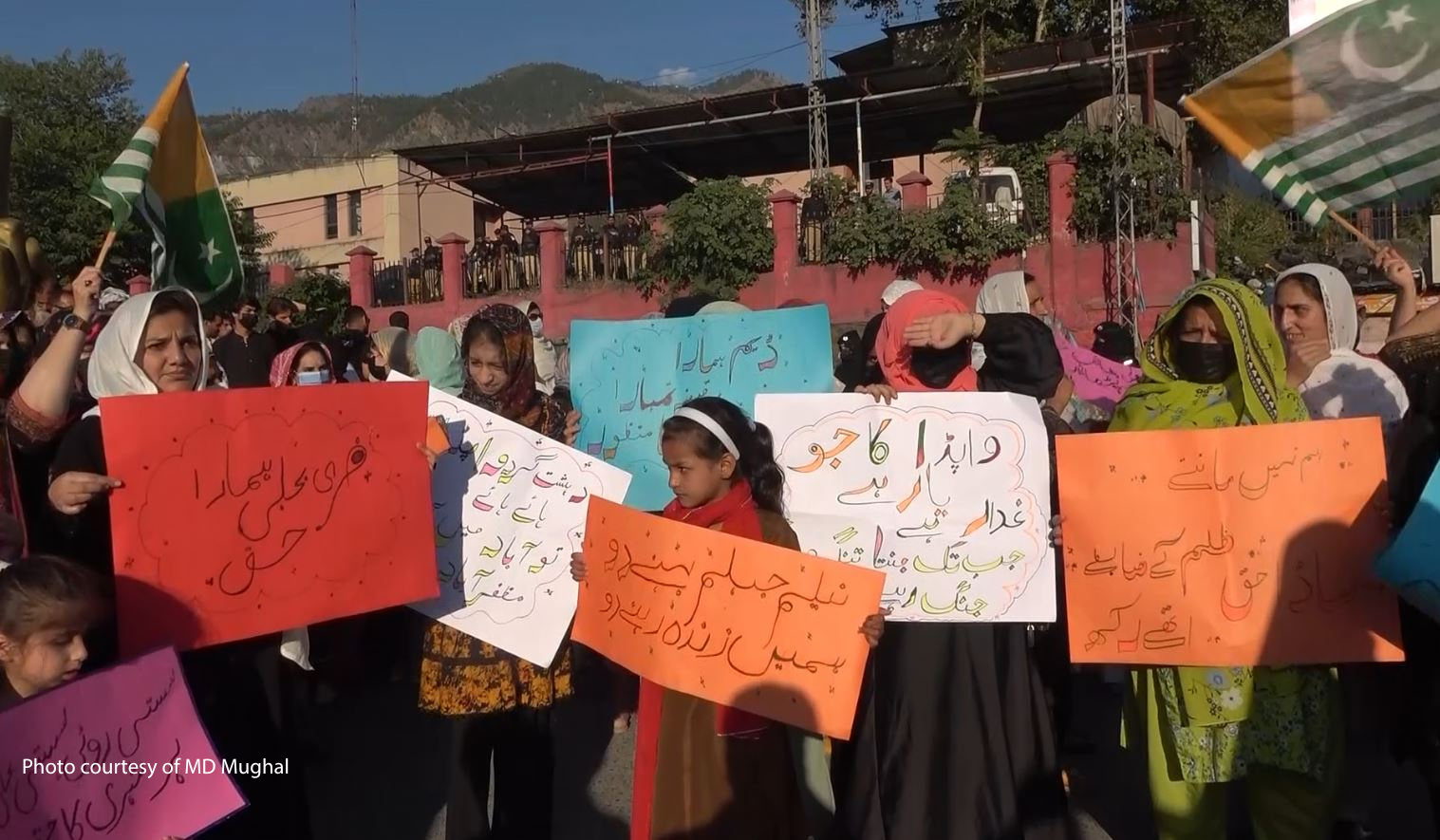
However, the people did not abandon the movement even during the chilling winter, and continued marching on snow covered roads while chanting slogans against the government.
This dedication of the people forced the government’s reconciliation committee to ask the action committee for two weeks’ time to take concrete steps for the fulfillment of the people’s demands.
After this, the joint action committee announced that copies of electricity bills would not be set ablaze on December 21, but peaceful protest rallies would be held in all parts of the state. It gave the government a deadline till January 8, 2024 to fulfil the demands, otherwise the practice of burning electricity bill copies would resume, and new future actions would be announced.
However, the government used delaying tactics while lodging cases against the people playing active role in the movement under Anti-Terrorism Act.
On February 4, 2024 the government issued a notification, precisely announcing the constitution of additional committees chaired by several ministers to address each point of the action committee’s charter of demand.
Recognising the difficulties of countering government opposition, the action committee withdrew all demands save three core demands: reducing wheat prices, reducing electricity prices, and ending the privileges enjoyed by the ministers and bureaucrats.
But after its February 4 notification, the government kept quiet and did not informed the action committee about any new developments. On March 5, 2024, the joint action committee’s member from Rawalakot, Umar Nazeer Kashmiri, declared that the government was not taking the people seriously, and announced plans for a long march of 210 kilometres from Bhimber, another district of Kashmir, to Muzaffarabad on May 11, 2024.
Before doing so, the action committee wrote letters to the chairman of the government's reconciliation committee asking about progress in meeting demands. In reply, the government said via a short letter that its process for meeting demands is in process, and that the government is ready to hold further rounds of negotiations.
This was seen as a delaying tactic. Immediately afterwards, preparations began for the long march. Meetings and consultations were holding in cafes, mosques, drawing rooms, or any other place where more than two people could gather.
In Rawalakot, enthusiasm was high. Planners decided that marchers from Mirpur and other districts would reach Rawalakot on May 11, from where caravans would then leave for the capital city of Muzaffarabad. However, the AJK government decided to crush the march by arresting people in Dadyal, a village in the Mirpur district, and blocking roads leading to Rawalakot on May 8.
The police tortured people in Dadyal and fired tear shells on them. A shell dropped at a girls’ school and many students fainted. (No one was killed). Seeing this apathetic attitude of the state, the action committee announced a shutdown and transport strike beginning at midnight on May 9.
On May 11, caravans from Mirpur left for Rawalakot. The government and its supporters fired bullets and shots, and local authorities attacked marchers with batons. Roads were closed by felling big trees and putting heaps of mud. But more than 40,000 marchers still managed to reach Rawalakot.
On May 12, when caravans of the Poonch and Mirpur Division were ready to leave for Muzaffarabad, the government’s representative reached Rawalakot to hold talks with the action committee. The delegation included officers of Pakistan Army and chief secretary of AJK, who is appointed by Pakistan to look after the state affairs. But the delegation was just another government attempt at delay, with the goal of holding the caravans until evening so people would return to their homes.
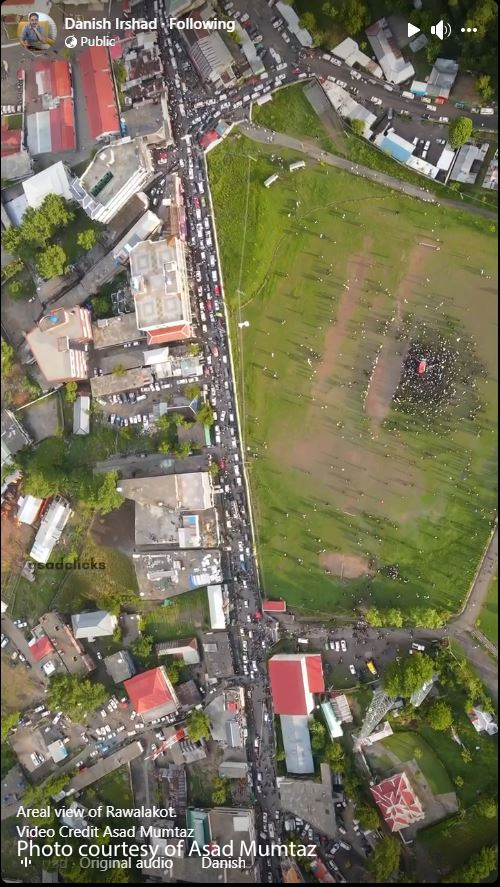
It didn’t work. Neither didn’t the government’s false telecasts, on major national TV channels, reporting falsely that the negotiations with the action committee had succeeded and that the long march had been called off.
The misinformation did confuse. Crowds waited for eight hours in Rawalakot to see if marches would begin. But at nearly 9 in the evening, the committee members came before the people just to tell them that the “government, once again did not give them anything, but fraud and deceit”.
Hearing this, many marchers felt lost. The night was darkening.
At this point, Umar Nazeer Kashmiri, member of joint public action committee from Rawalakot and president of the Rawalakot Traders Union, grabbed a microphone and asked the crowd, “Should we leave now for Muzaffarabad or wait for the morning? Raise your hands if you want to leave now.”
Everyone in the crowd raised their hand and so the caravan of more than 10,000 vehicles left for Muzaffarabad. They decided to spend the night at Dhirkot, and enter Muzaffarabad with the first rays of the rising sun.
However, government representatives once again showed up to hold talks with the action committee, and asked that caravans be held at Dhirkot because the government was ready to accept their demands.
In response, the action committee asked for official notifications that demands had been met. They were tired of being lied to and delayed. The AJK prime minister held a press conference in Islamabad, announcing that the government of Pakistan has given funds amounting to 23 billion rupees to the AJK government for cutting the prices of electricity and flour. He also showed two notifications on TV screen to make the action committee believe that their demands were accepted in real.
But the announcement and declaration weren’t real. To prevent the truth from spreading, the government suspended internet and cellular services in the state. But people used the loudspeakers of mosques to announce that the protests, rallies and the long march would continue.
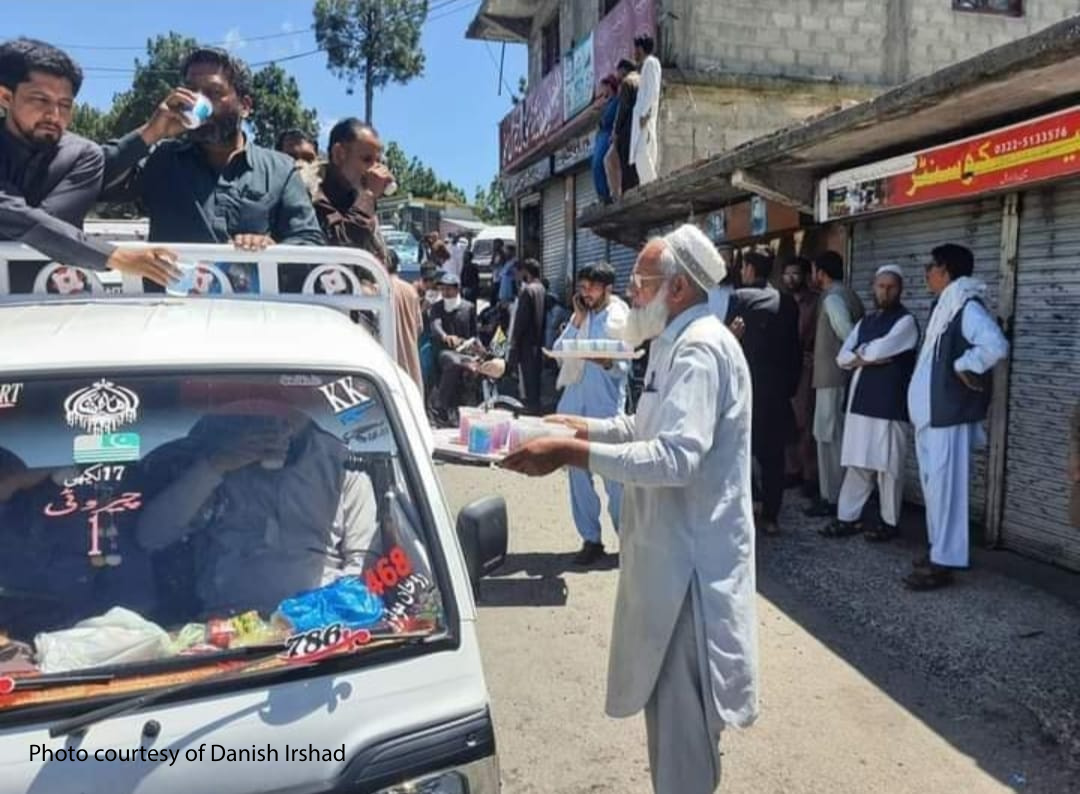
The caravans started moving to Muzaffarabad near the afternoon on May 13. As soon they crossed Dhirkot, they caught mobile signals from towers erected in Murree areas of Pakistan, and were able to tell the wider world what was happening.
As the caravans approached Muzaffarabad, the Pakistan government was deputising Punjab Rangers and Frontier Constabulary, two paramilitary forces, to do its bidding. Their goal was to try to foment violence among local people. But local residents in Muzaffarabad, steadfastly and peacefully, would not allow the paramilitaries to enter the city. An elderly man in a video circulating on social media was seen telling the Rangers that he will not let them enter Muzaffarabad because people from all across Kashmir are gathered there, and Rangers came to kill them.
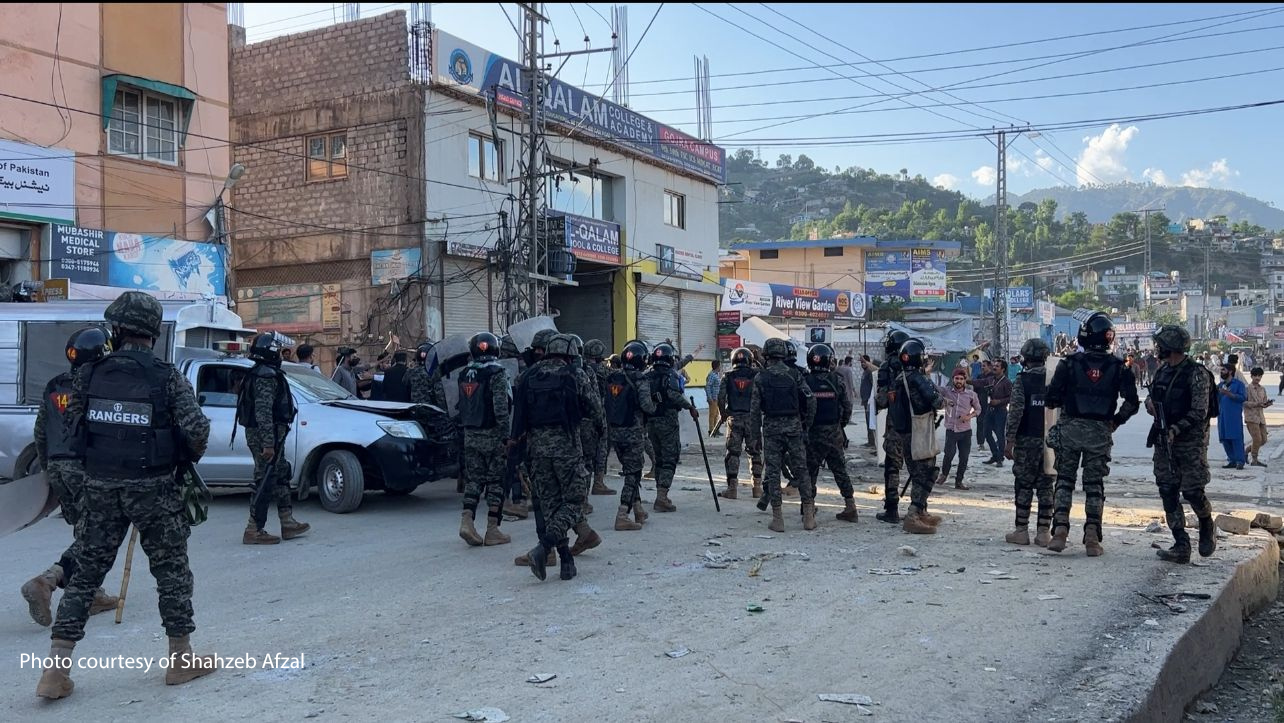
One scuffle between Rangers and the locals cost three young people their lives. On the evening of May 13, people held a protest on the AJK University grounds, along with the bodies of the three killed by Rangers.
Next morning, May 14, the action committee issued a video message, declaring that they had received official notifications about acceptance of their three demands. The rest of the day would be devoted to mourning the three deceased youngsters. People started leaving Muzaffarabad for their villages and homes after offering the funeral prayers of the deceased.
What explains the unity of this moment? The Kashmiri journalist Haris Qadeer highlighted a shift in focus among local individuals and tribes who had once been utilized by Pakistan for Jihad in Indian-administered Kashmir, towards more active engagement in local affairs.
Haris traces the origins of this shift back to August 2019, when India revoked the special autonomous status of Jammu and Kashmir. Concerns arose among the people regarding Pakistan potentially adopting similar measures in their region. Economic grievances compounded these concerns, with rising prices of essential goods and a lack of control over local resources, particularly hydropower production.
The formation of People's Rights Forum in June 2022 also marked a turning point, catalyzing an earlier wave of protest demonstrations and failed negotiations. However, when the forum-led march towards Islamabad in September 2022 was met with harsh state repression. The People’s Rights Movement emerged, spearheaded by nationalist parties, leading to the formation of public action committees.
Similarly, Kashmiri journalist Danish Irshad says that unemployment, lack of opportunities, and a nonchalant government attitude fueled the movement. With people in Rawalakot having no jobs or economic stakes to defend, they had nothing to lose, and could dedicate time and energy to the cause. Many were sustained by financial support from family members abroad.
Advocate Nosheen Kanwal, who was elected counselor for Rawalakot Ward 22 in 2022, says that year’s local elections, held in the region after 31 years, served as a new platform for citizens to discuss their grievances and rights, energizing the movement. Previously, with general elections held only every five years, such opportunities for engagement were limited, hindering the development of a vibrant political landscape. Women in particular, Nosheen says, were activated locally for the first time, taking the discussion from cafes into households and other private settings.
The AJK government also miscalculated by failing to allocate funds to local government representatives. The ministers of the AJK government proved to be more interested in “buying” votes than genuinely addressing public concerns after election. So when the government sought to pressure local government officials to stay out of the people’s movement, many officials and party leaders refused, with some resigning from their positions in protest.
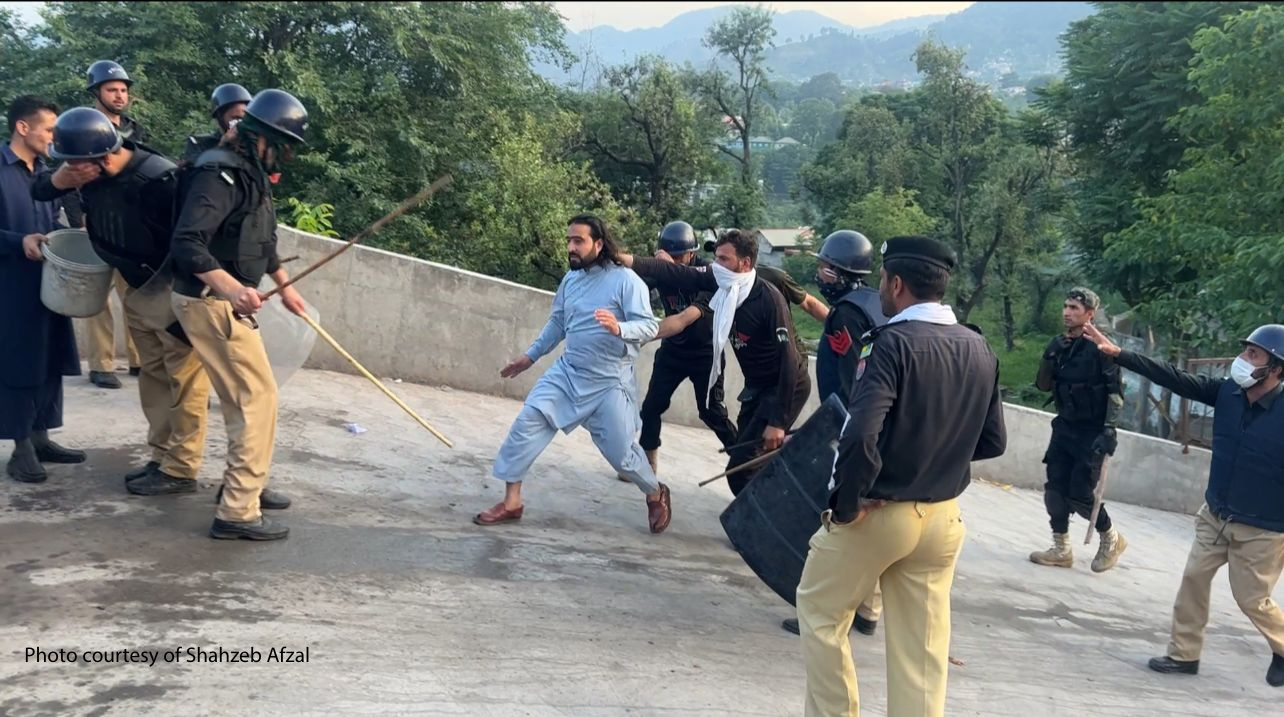
The region’s political leaders were out of touch with grassroots protestors, and repeatedly and mistakenly though delay would lead to the dissipation of public demonstrations. And their subsequent use of force to suppress movements—including unjust incarcerations, false charges, and instances of torture—only galvanised the protestors. And national leaders didn’t help with ineffectual statements issued from the comfort of Islamabad, underscoring their detachment from the ground realities faced by the people.
In retrospect, the Kashmiri diaspora in Europe, the United States, Canada and the Middle East were crucial in sustaining the movement. They provided financial support by sending funds to marchers’ families in Rawalakot and other areas. Members of the diaspora actively engaged on social media and maintained contact with movement leaders and participants, offering encouragement and sharing information.
And, after the use of paramilitaries to suppress the long march, Kashmiri diaspora members in the UK protested outside the Pakistani High Commission in London on May 13. Similar demonstrations took place in Canada, where Kashmiris urged the government to refrain from using force against protesters and instead address their legitimate grievances.
Fake Democracy in Kashmir
The long march and protests also showed the need for structural changes in democracy. In Pakistan-administered Kashmir, the Legislative Assembly comprises 53 elected representatives, with 45 general seats and 8 reserved seats. Among these, 33 members are elected from the 10 districts of AJK, while the remaining 12 general seats are filled by Kashmiri migrants settled in Pakistan.
Qadeer, the journalist, has shown that a significant portion of the general seats is manipulated by the Pakistani military, and Sector Commanders of Inter-Services Intelligence (ISI) and Military Intelligence (MI), as well as the General Officer Commanding (GOC) of the Murree Division. This manipulation is done by “pre-poll rigging,” providing extra and sometimes corrupt support for those candidates who want to integrate Kashmir into Pakistan. Only a handful of candidates make it to the assembly without military backing. The 12 migrant seats are also typically awarded to individuals loyal to the Pakistan Army.
This setup enables those in power to orchestrate leadership changes at will, replacing governments that dare to challenge their authority. The current AJK Prime Minister, Anwar-ul-Haq, ascended to power through such means, receiving 49 votes from the assembly after his predecessor was ousted.
Kashmiri journalist Danish Irshad highlights Anwar's public unpopularity, particularly in Bhimber, the constituency where he was elected. Anwar's decision to increase the cabinet's size to 40 people—a supermajority of the assembly—contradicted the 13th Amendment of AJK’s Interim Constitution, which capped cabinet membership at 30% of the assembly.
The prime minister and the political establishment are now on the defensive. After enduring so many betrayals, Kashmiris are rallying to boycott any political party or politician who failed to stand with them during the marches and protests for their rights.
The long march raised awareness about public rights and the significance of resource control. A question now is whether the action committee can itself field candidates in future elections. If it doesn’t, its long-term influence may be limited. If general elections proceed as scheduled in July 2026, traditional leaders will find it hard to secure seats.
And if the current public sentiment against the government persists through the elections, Pakistan-administered Kashmir may finally get a genuine government that truly represents the will of the people.
